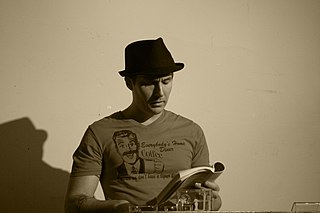A Quote by Helene Hanff
I'll have mine [The Book-Lovers' Anthology] till the day I die - and die happy in the knowledge that I'm leaving it behind for someone else to love. I shall sprinkle pale pencil marks through it pointing out the best passages to some book-lover yet unborn.
Related Quotes
The rest of my days I'm going to spend on the sea. And when I die, I'm going to die on the sea. You know what I shall die of? I shall die of eating an unwashed grape. One day out on the ocean I will die — with my hand in the hand of some nice-looking ship's doctor, a very young one with a small blond moustache and a big silver watch.
You all know that certain things are necessary to make a religion. First of all, there is the book. The power of the book is simply marvellous! Whatever it be, the book is the centre round which human allegiance gathers. Not one religion is living today but has a book. With all its rationalism and tall talk, humanity still clings to the books. In your country every attempt to start a religion without a book has failed. In India sects rise with great success, but within a few years they die down, because there is no book behind them. So in every other country.
The book I am best known for, or only known for, is a novel I am prepared to repudiate: written a quarter of a century ago, a jeu d'esprit knocked off for money in three weeks, it became known as the raw material for a film which seemed to glorify sex and violence. The film made it easy for readers of the book to misunderstand what it was about, and the misunderstanding will pursue me till I die. I should not have written the book because of this danger of misinterpretation.
Through an experience that simultaneously involved my sensibility and intelligence, I realized early on that the imaginative life, however morbid it might seem, is the one that suits temperaments like mine. The fictions of my imagination (as it later developed) may weary me, but they don't hurt or humiliate. Impossible lovers can't cheat on us, or smile at us falsely, or be calculating in their caresses. They never forsake us, and they don't die or disappear. --The book of Disquiet
I'm still happy with the way Einstein's Dreams came out. That book came out of a single inspiration. I really felt like I was not creating the words, that I was hearing the words. That someone else was speaking the words to me and I was just writing them down. It was a very strange experience. That can happen with a short book. I don't think it could happen with a long book.
Tis the good reader that makes the good book; in every book he finds passages which seem confidences or asides hidden from all else and unmistakenly meant for his ear; the profit of books is according to the sensibility of the reader; the profoundest thought or passion sleeps as in a mine, until it is discovered by an equal mind and heart.




































